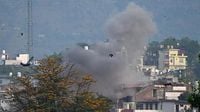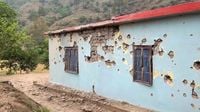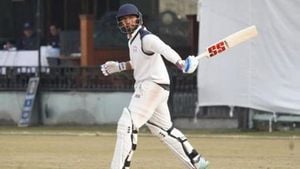On May 7, 2025, the Poonch district in Jammu and Kashmir became the epicenter of a deadly conflict as cross-border artillery and mortar shelling from Pakistan resulted in the tragic deaths of at least 12 individuals, with over 57 others injured. This escalation followed India’s launch of ‘Operation Sindoor,’ a military campaign aimed at dismantling terror infrastructure in Pakistan and Pakistan-occupied Kashmir (PoK) in retaliation for a heinous attack in Pahalgam that claimed 26 lives on April 22.
The situation in Poonch escalated quickly, with reports indicating that the shelling targeted civilian areas, including the Central Gurdwara Sri Guru Singh Sabha Sahib, where three members of the Sikh community were among the casualties. The Shiromani Akali Dal (SAD) expressed deep sorrow over the loss of these lives, identifying the deceased as Bhai Amrik Singh Ji, a raagi (devotional singer), Bhai Amarjeet Singh, and Bhai Ranjit Singh. SAD president Sukhbir Singh Badal condemned the attack, stating, "Strongly condemn the inhuman attack by Pakistani forces on the sacred Central Gurdwara Sri Guru Singh Sabha Sahib in Poonch, in which three innocent Gursikhs lost their lives."
As the violence unfolded, the district administration of Poonch took immediate measures to ensure the safety of residents. Authorities designated nine public shelter camps equipped with essential amenities for those wishing to relocate from forward villages impacted by the shelling. Locations such as Caramel School and the Dingla University Campus were identified as safe havens for those fleeing the violence.
The shelling in Poonch was part of a broader pattern of ceasefire violations by Pakistan along the Line of Control, marking the 13th consecutive day of such incidents. The Indian government, responding to these provocations, reaffirmed its commitment to protect its citizens and retaliate against any future attacks. An Indian military spokesperson noted that the response to the Pahalgam attack was swift and decisive, emphasizing that India would not hesitate to target military installations in Pakistan if necessary.
In a somber reflection on the ongoing conflict, Giani Kuldeep Singh Gargaj, the acting jathedar of Akal Takht, condemned the Pakistani shelling on the gurdwara, which led to the death of four innocent civilians. He urged both governments to prioritize peace and dialogue over conflict, stating, "War always harms humanity and often results in the death of innocent people. Every possible effort be made to resolve the current situation."
Among the injured, 42 individuals were reported to be in Poonch, with many in critical condition, including children. The ongoing hostilities have created a climate of fear and uncertainty, with local residents expressing their distress over the continuous shelling. Visuals from the affected areas depicted damaged homes and shattered windows, illustrating the severe impact of the violence on civilian life.
In light of the recent violence, Punjab Chief Minister Bhagwant Mann also condemned the attack, emphasizing that targeting civilians is utterly unacceptable. He expressed his condolences to the families of the victims, stating, "Targeting the common people is completely wrong. We express our heartfelt condolences to the families of the deceased."
The Indian armed forces executed Operation Sindoor early on May 7, successfully striking nine terror targets, including locations in Bahawalpur, Muridke, and Sialkot, as well as five sites in PoK. This operation marks one of the most significant military actions by India within Pakistani territory since 1971, aiming to dismantle terror camps and prevent future attacks against Indian citizens.
As tensions continue to rise, both nations stand at a precarious crossroads, with the potential for further escalation looming on the horizon. The international community watches closely, as the ongoing conflict not only threatens regional stability but also poses a humanitarian crisis for the civilians caught in the crossfire.
In response to the situation, the Indian government has called for a meeting with foreign representatives to discuss the implications of the recent attacks and the need for a united front against terrorism. Meanwhile, local officials in Jammu and Kashmir are working tirelessly to provide relief and support to those affected by the violence, ensuring that essential services are available to all who seek refuge in the designated shelter camps.
The situation in Poonch serves as a stark reminder of the ongoing strife in the region, where the cycle of violence continues to claim innocent lives. As families mourn their losses and communities grapple with the aftermath of the attacks, the hope for lasting peace remains a distant aspiration.
With the prospect of further military actions looming, the call for dialogue and reconciliation grows ever more urgent. The voices of the affected communities, along with the pleas for peace from leaders like Giani Kuldeep Singh Gargaj, underline the necessity for both nations to seek a resolution that honors the sanctity of life and the rights of civilians caught in the crossfire.
As the world watches, the people of Poonch and the broader Jammu and Kashmir region continue to endure the consequences of a conflict that has persisted for decades. The need for a comprehensive approach to peace and security in the region has never been more critical, as the stakes rise and the toll on human life continues to mount.





